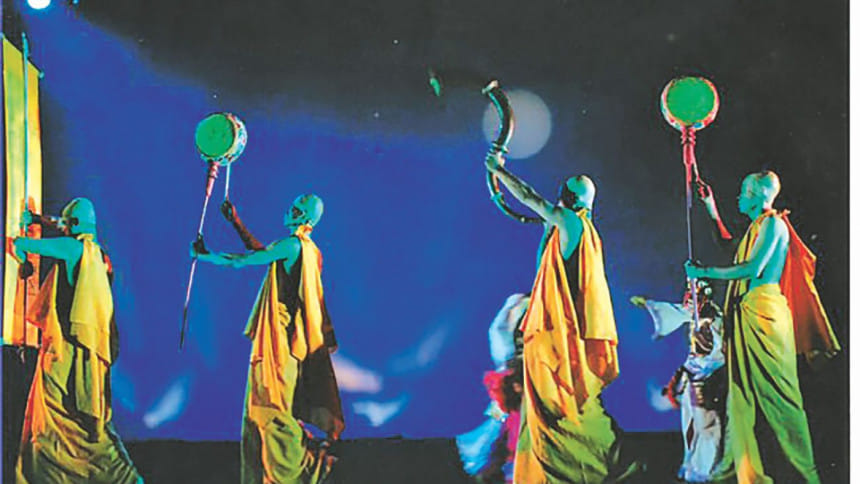Natir Puja: A Tale of Devotion and Sacrifice as Opposed to Jealousy and Tyranny

Quite a few of Rabindranath Tagore's dance dramas and poems develop around the idea of Buddhist philosophy that induces people to lead a simple life, to gain an understanding of the injustice and inequality prevailing in society, and to acquire knowledge and develop a deeper insight about the universe. Such a major problem reflected in Tagore's work is the class and caste system of the Indian society. It would be relevant to recall that one reason that Gautama or Buddha left home is because he recognized that the traditional religions practiced during his time were unable to absolve the dissatisfaction and frustration abound in life. The class and caste system that divided and segregated people troubled him deeply. Little wonder that all the principal religions of the world rose for emancipation of people from such bondages.
Unfortunately, the corrupt human heart does not allow such practices to go unhindered. Even though at the root of any religious faith there is a high ideal to free people from evil practices and oppression, they also are ideological weapons to control the same people. In every age, therefore, figures like Christ and Buddha rise to remind humanity that there is a law beyond the one practiced through selfishness and pettiness of everyday life. Hence peace and faith are required to be restored at the price of a sacrifice that shows the significance of selfless love, the futility of social class and caste. Actually, the truth is ever present, but sometimes it just takes one act to see that there is a truth higher than all the material wealth one can ever accumulate.
Tagore explored various perspectives of Buddhism in many of his works. Malini, Chandalika and Natir Puja are three dance dramas that deal with this theme. Natir Puja (Devotion of the Court-Dancer)has at its centre the pure soul of a mere dance-girl who is jeered on as a fallen woman, and who considers herself unworthy of even attending the words of Buddha. But her humility reflects one of the core ideals of Buddhism and she is called upon by the devout followers of Buddha to perform the rituals of a priestess before the altar of Buddha. In the process, her devotion is preferred over the offerings of the royal princesses some of whom feel insulted. One of them, the princess Ratnavali, takes measures to punish the court-dancer by throwing a choice before her—either to dance in front of the altar as an affront to Buddha, or to face death. The dance-girl Srimati accepts the royal order of dancing before the altar, but she succeeds in revealing herself as a devout follower of Buddha and embraces death. The story-line also focuses on the nature of the faith of Buddhism through the figure of Lokeswari, the wife of the former King, Bimbisar. Lokeswari's only son Chitro had left home to follow the path of Buddha, and his mother, who used to be a follower of Buddha, emerges as a frenzied woman. She cannot accept that her only son had left home and her husband renounced the throne when another son Ajatsatru wanted to be the King. For the first time in her life, she questions the validity of a belief that might want human beings to renounce all their precious possessions.
Through an intricate series of events Natir Puja unfolds and delves into several significant aspects of human dilemma. First, through the figure of Srimati and Lokeswari, the nature of devotion is explored. Second, the problem of caste system is brought out through characters such as Ratnavali who cannot accept that a lower caste man or woman can be considered more pious than the royal followers in the eyes of God. Third, that the gravest sinner can seek forgiveness and repentance is always a possibility.
Natir Puja is a tale elaborated from another longer poem by Tagore titled, "Pujarini" (The Worshipper). At the centre of both tales stands Srimoti, who claims to be "Buddher dashi," or a handmaiden of Buddha. The term "dashi" should not be considered derogatory here but one that focuses on the nature of humility in Buddhism. The meaning of "Buddha" is teacher and in the traditional Vaidik ideology, a teacher claims the highest status in society. Therefore, the chance of serving the teacher is indeed a privilege. And as Srimoti says, "My days of false modesty are over. I would not sing falsely, but you did not grasp what your eyes witnessed." She points out how the faithful sees and hears with one's heart. Eyes might see, but eyes would not always recognize what they see.
Lokeswari, on the other hand, reminisces how once she was an ardent follower of Buddha, but it becomes clear from her words that she had thought more of distinction than salvation. And yet, Buddha preached freedom from avidya (darkness of ignorance and limiting of consciousness). A man living the life of avidya, spends his life in a spiritual slumber. Therefore, devotion in Buddha requires spiritual awakening, which Lokeswari fails to see. The very name of Lokeswari actually suggests her dilemma—the Queen of the World, and naturally, she could not give up the ownership of the materialistic world. In the end, however, Lokeswari realizes her error of judgment, and honours Srimoti's sacrifice. After all, Srimoti is able to show that for faith and truth one should be ready to offer the highest price, one's own life if necessary.

As a court-dancer, Srimoti might receive a lot of attention, but her position is still that of a high-class courtesan. There are quite a few references where the royal family members make fun of her. Even the elderly Queen Lokeswari scoffs at the idea that Srimoti might turn out to be a priestess of Buddha and the princesses will be her attendants: "Disciple of this dancing girl! That's what will happen indeed! Now it's up to the fallen woman to arise with words of salvation." From the onset, the Princess Ratnavali, too, makes fun of the calm and quiet nature of Srimoti who is frequently affronted by the princesses but rarely replies. It is almost as if Ratnavali senses her superior nature and takes her to task by insulting her in whatever way possible. The situation escalates when Srimoti is honoured by the Buddhist monks. At that point, Ratnavali makes snide remarks about the Bhikkhu Upali born of a barber family, or Sunado, the son of a milkman, or Sunit, an untouchable. She forgets that Buddhism is a faith that nullifies class and caste system. Her words also reveal that human psychology is deeply steeped in pettiness, jealousy and arrogance, and it takes sufferings and remorse to do away with them.
So we come to the last point—the theme of repentance and forgiveness. The figure of Lokeswari is an everyman or woman. She is not an evil person, but nor is she convinced by the words of the bhikkhuni who attempts to make her see that there is a difference between the value of gold and that of the light. In today's world this is where most of us stand. The materialistic ideology has taken over the ethical and philosophical aspects of life. As a result, we keep on asking for more and there is no end to our craving. In the process of worshipping Mammon, we overlook humanity and humility. We not only forget to look at the sufferings of other, we choose to ignore them. Lokeswari's humanity returns to her when Srimoti prepares to dance in front of Buddha's altar. She offers her poison so that she dies before committing a sin. And when, Srimoti unfolds through her dancing that she never meant to insult Buddha but to honour him, once again Lokeswari joins her in reciting,
Buddham saranam gacchami
I submit to the Buddha for refuge
Dhammam saranam gacchami
I submit to the Dhamma for refuge
Sangham saranam gacchami
I submit to the Sangha for refuge.
Even the Princess Ratnavali, who had insulted Srimoti earlier and is responsible for bringing out the royal order, finally kneels down before the dead body of the dance-girl to pay respect. The play ends with Ratnavali chanting the words of Buddha.
Tagore's dance drama has played out beautifully to bring out a historical aspect of the Indian culture. The story of Bimbisar and his son Ajatsatru may not have been represented the way history records it, but the tale certainly brings out the tension and the hostility that poison the world at every age. The corrupt and selfish human heart tends to assume that property and wealth hold the key to success and happiness, but ends up in welcoming segregation, arrogance and jealousy. So, should we consider love, affection and sacrifice as mere human follies? Should we abadon the idealistic notions and consider wealth and control as our ultimate gain? Perhaps, the answer lies in the wasteland of our postmodern civilization, which has already sacrificed its saviours and is still waiting to be atoned
Sohana Manzoor is Associate Professor, Department of English & Humanities, ULAB. Currently, she is also the Literary Editor of The Daily Star.

 For all latest news, follow The Daily Star's Google News channel.
For all latest news, follow The Daily Star's Google News channel. 



Comments